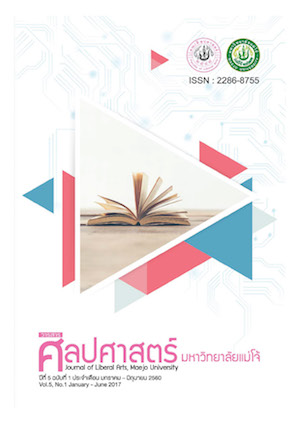อุตสาหกรรมการสร้างวัฒนธรรมและการสื่อสารในยุคดิจิทัล กรณีศึกษาอุตสาหกรรมการสร้างวัฒนธรรมไทยในจีน (Cultural Industry and Communication in Digital Era: A Case Study of Thai Cultural Industry in China)
Main Article Content
Abstract
อุตสาหกรรมการสร้างวัฒนธรรมเป็นกระบวนการปฏิวัติอุตสาหกรรมจากแง่มุมด้านเศรษฐศาสตร์มาสู่มุมมองเชิงสังคมวัฒนธรรม เมื่อวัฒนธรรมกลายเป็นสินค้าและถูกป้อนเข้าสู่กระบวนการผลิตอย่างมีระบบส่งผลให้เกิดพลังอำนาจในรูปแบบใหม่ต่างจากอุตสาหกรรมการสร้างวัฒนธรรมแบบเดิมที่สร้างผู้คนมีมิติเดียว ทั้งนี้นิยามใหม่ของอุตสาหกรรมการสร้างวัฒนธรรมเป็นการใช้อำนาจละมุน (soft power) เพื่อครอบงำทางความคิด รวมถึงการสื่อสารในยุคดิจิทัลที่ใช้เทคโนโลยีเป็นพลังขับเคลื่อนทำให้เกิดสังคมเครือข่ายที่ส่งผลให้อุตสาหกรรมการสร้างวัฒนธรรมได้แพร่กระจายในวงกว้างอย่างรวดเร็ว เกิดผู้ส่งสารในระดับมวลชน (mass self-communication) ที่สามารถสร้างเนื้อหาด้วยตนเอง (self-content generated) และมีอำนาจในการเลือกในประเด็น ที่ตนเองสนใจ (self-selected) เกิดการผสมผสานวัฒนธรรม (hybrid cultural) สำหรับกรณีอุตสาหกรรมการสร้างวัฒนธรรมไทยในจีนผ่านสื่อบันเทิงมีปัจจัยที่ส่งผลต่ออุตสาหกรรมดังกล่าว ได้แก่ ความใกล้ชิดบริบทสังคมและวัฒนธรรม ความโดดเด่นด้านเนื้อหา การสนับสนุนนโยบายของรัฐบาล ข้อจำกัดด้านนโยบายสื่อบันเทิงของจีน ส่งผลในมิติสังคม คือ การเกิดเครือข่ายทางสังคมและพื้นที่ทางวัฒนธรรม (cultural sphere) การประกอบสร้างความเป็นไทยผ่านการผลิตสื่อบันเทิงที่มีเนื้อหาเกี่ยวกับความเป็นไทย มิติเศรษฐกิจ คือ อุตสาหกรรมการสร้างวัฒนธรรมไทยในจีนช่วยขับเคลื่อนเศรษฐกิจเชิงสร้างสรรค์ ดังนั้นอุตสาหกรรมการสร้างวัฒนธรรมผ่านการสื่อสารในยุคดิจิทัลส่งผลต่อทัศนคติ พฤติกรรมนำมาสู่การสร้างอาณานิคมทางวัฒนธรรมแบบใหม่
Cultural Industry is a process of industry revolution which moves its aspect from economics to social culture. When culture becomes a product fed to production process systematically, it results in a new form of power. Contrarily, innate cultural industry has only one dimension which is creating human being. However, this latest definition of cultural industry is the use of soft power to dominate people’s thoughts. Together with communication in digital era, it is a driven power forming social network, which causes a rapid expansion of cultural industry. Also, it creates a mass self-communication with self-content generated, self-selected, and hybrid cultural. In a case study of Thai cultural industry in China via entertainment media, there are factors that affect such industry namely intimacy of socio-cultural context, notability of content, support from government policy, limitation of Chinese entertainment policy. In the dimension of society, social network, cultural sphere and Thainess are constructed through entertainment media. Creative economy drive, in the dimension of economy, is another consideration in cultural industry in China. Therefore, cultural industry and communication in digital era effects attitude behavior led to new cultural imperialism.
Article Details
Section
Academic Article
ต้นฉบับที่ได้รับการตีพิมพ์ในวารสารคณะศิลปศาสตร์ มหาวิทยาลัยแม่โจ้ ถือเป็นกรรมสิทธิ์ของมหาวิทยาลัยแม่โจ้ ห้ามนำข้อความทั้งหมดหรือบางส่วนไปพิมพ์ซ้ำ เว้นเสียแต่จะได้รับอนุญาตจากมหาวิทยาลัยฯ เป็นลายลักษณ์อักษร

